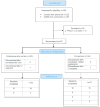Remote Delivery of the Cuidándome Telehealth Intervention for Self-Management of Depression and Anxiety Among Latina Immigrant Women: Randomized Controlled Trial
- PMID: 38190239
- PMCID: PMC10804250
- DOI: 10.2196/52969
Remote Delivery of the Cuidándome Telehealth Intervention for Self-Management of Depression and Anxiety Among Latina Immigrant Women: Randomized Controlled Trial
Abstract
Background: Growing evidence suggests that Latina immigrant survivors of adverse childhood experiences (ACEs) are at increased risk for developing and remaining with either depression or anxiety or both symptoms. This study examined the feasibility and acceptability of a telehealth intervention-Cuidándome (quee-DAN-doh-meh, "taking care of myself"). Cuidándome is a 10-week, patient-centered, trauma-informed intervention delivered by a trained facilitator that promotes self-management of depression and anxiety symptoms through improved problem-solving skills and strategies.
Objective: The aim of this study was to examine the feasibility and acceptability of Cuidándome delivered remotely (via Zoom) with Latina immigrant ACE survivors with either depression or anxiety or both symptoms. We also estimated the effect sizes associated with the intervention on decreasing depression and anxiety symptoms and improving social problem-solving styles.
Methods: We evaluated Cuidándome using a randomized controlled trial design. Latina immigrants (N=47) who had experienced at least 1 ACE and had at least mild depression or anxiety symptoms were randomized to Cuidándome or a comparison group delivered by trained facilitators. We assessed for changes in depression and anxiety symptoms as well as social problem-solving styles at baseline, post intervention, and 3- and 6-month follow-up.
Results: Analyses indicated significant decreases over time within both Cuidándome and comparison groups for depression and anxiety symptoms and maladaptive problem-solving. The intervention effect was largest for anxiety; at 6-month follow-up, Cuidándome participants had significantly lower anxiety scores than the comparison group. In addition, we observed a greater average point reduction in depression symptoms at 6 months among Cuidándome participants (5.7 points) than in the comparison group (3.7 points).
Conclusions: A mental health program delivered via Zoom by a trained facilitator was feasible and acceptable to Latina immigrant women and can be beneficial for reducing anxiety and depression symptoms. More research is needed to assess the effectiveness of Cuidándome among a powered sample size of Latina immigrants.
Trial registration: ISRCTN Registry ISRCTN16668518; https://www.isrctn.com/ISRCTN16668518.
Keywords: Hispanic; Latin; Latina; Latina immigrant; Latino; Latinx; Spanish; acceptability; adverse; anxiety; child; childhood; children; controlled trial; controlled trials; depression; depressive; digital health; eHealth; feasibility; immigrant; immigrants; intervention study; mental health; mobile phone; problem-solving; randomized; survivor; telehealth; telemedicine; trauma; trauma-informed; traumatic.
©Carmen Alvarez, Subhash Aryal, Elizabeth Vrany, Maria Jose Sanchez R, Rosalphie Quiles, Lia Escobar-Acosta, Felicia Hill-Briggs. Originally published in JMIR Formative Research (https://formative.jmir.org), 08.01.2024.
Conflict of interest statement
Conflicts of Interest: None declared.
Figures
Similar articles
-
Cuidándome: A trauma-informed and cultural adaptation of a chronic disease self-management program for Latina immigrant survivors with a history of adverse childhood experiences and depression or anxiety symptoms.Cultur Divers Ethnic Minor Psychol. 2025 Apr;31(2):356-366. doi: 10.1037/cdp0000639. Epub 2024 Feb 1. Cultur Divers Ethnic Minor Psychol. 2025. PMID: 38300599
-
Promoting mental health in Latina immigrant women: Results from the Amigas Latinas Motivando el Alma intervention trial.Soc Sci Med. 2023 Mar;321:115776. doi: 10.1016/j.socscimed.2023.115776. Epub 2023 Feb 16. Soc Sci Med. 2023. PMID: 36809698 Free PMC article.
-
Patterns of Adverse Childhood Experiences, Social Problem-Solving, and Mental Health Among Latina Immigrants.J Interpers Violence. 2022 Dec;37(23-24):NP22401-NP22427. doi: 10.1177/08862605211072159. Epub 2022 Jan 30. J Interpers Violence. 2022. PMID: 35098761
-
Interventions for adults with a history of complex traumatic events: the INCiTE mixed-methods systematic review.Health Technol Assess. 2020 Sep;24(43):1-312. doi: 10.3310/hta24430. Health Technol Assess. 2020. PMID: 32924926 Free PMC article.
-
A comparison of the effectiveness of cognitive behavioural interventions based on delivery features for elevated symptoms of depression in adolescents: A systematic review.Campbell Syst Rev. 2024 Jan 7;20(1):e1376. doi: 10.1002/cl2.1376. eCollection 2024 Mar. Campbell Syst Rev. 2024. PMID: 38188230 Free PMC article. Review.
References
-
- Llabre MM, Schneiderman N, Gallo LC, Arguelles W, Daviglus ML, Gonzalez F, Isasi CR, Perreira KM, Penedo FJ. Childhood trauma and adult risk factors and disease in Hispanics/Latinos in the US: results from the Hispanic Community Health Study/Study of Latinos (HCHS/SOL) sociocultural ancillary study. Psychosom Med. 2017;79(2):172–180. doi: 10.1097/PSY.0000000000000394. https://europepmc.org/abstract/MED/27606797 - DOI - PMC - PubMed
-
- Ruiz Soto AG, Banulescu-Bogdan N, Clark-Ginsberg A, Lopez A, Velez A. Migration narratives in Northern Central America: how competing stories shape policy and public opinion in Guatemala, Honduras, and El Salvador. Migration Policy Institute. [2023-09-01]. https://www.migrationpolicy.org/research/migration-narratives-central-am... .
-
- Alvarez C, Sabina C, Brockie T, Perrin N, Sanchez-Roman MJ, Escobar-Acosta L, Vrany E, Cooper LA, Hill-Briggs F. Patterns of adverse childhood experiences, social problem-solving, and mental health among latina immigrants. J Interpers Violence. 2022;37(23-24):NP22401–NP22427. doi: 10.1177/08862605211072159. - DOI - PubMed
-
- Kim G, Aguado Loi CX, Chiriboga DA, Jang Y, Parmelee P, Allen RS. Limited English proficiency as a barrier to mental health service use: a study of Latino and Asian immigrants with psychiatric disorders. J Psychiatr Res. 2011;45(1):104–110. doi: 10.1016/j.jpsychires.2010.04.031.S0022-3956(10)00141-X - DOI - PubMed
-
- Pro G, Brown C, Rojo M, Patel J, Flax C, Haynes T. Downward national trends in mental health treatment offered in Spanish: state differences by proportion of Hispanic residents. Psychiatr Serv. 2022;73(11):1232–1238. doi: 10.1176/appi.ps.202100614. https://ps.psychiatryonline.org/doi/10.1176/appi.ps.202100614 - DOI - DOI - PubMed
LinkOut - more resources
Full Text Sources
Miscellaneous


